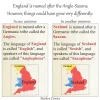Prior to our last Camino, I thought it might be useful to learn some more Spanish.
The aim was to build on my already impressive vocabulary of about 20 words, that dealt mainly with food and drink!
The big goal this time, would be to achieve the ultimate in flexibility and independence…
To be able to book a room over the phone!
So I enlisted the help of Jose who lives in our hometown, and who originally hails from Ponferrada.
Whilst we started with the aim of telephone room booking we soon progressed onto other essentials, such as calling the police, or an ambulance. As well of course as understanding pilgrim menus…
Now my better half came to the first lesson and promptly decided that I should be the linguist for this trip. European languages not being her strong suit. She would merely take on the role of trip ‘ supervisor’…
So the language training amounted to about 6 one hour lessons all up. Much of it taken up with revision. Homework not being My strong suit….
So let’s just say that progress was minimal. A term my school teachers would find very familiar…
So all was going well. I was coping with basic pilgrim menus. Asking for extra pillows and even making hotel bookings on the phone!
And then the cracks started to appear…
I think it was a visit to a rather upmarket restaurant. No pilgrim menus here! The menu was a struggle to say the least…
I could see it coming.
“How much did we spend on Spanish lessons”? Thankfully the waiter helped out.
The next major obstacle was a visit to the medical centre in carrion. This whole episode warrants a post of its own! But let’s just say, for now, Jose’s excellent teaching did not stretch to the more intimate parts of a ladies anatomy!
“We should get a refund on those lessons,” exclaimed the patient!
But I digress. My favourite words.
Vale. Pronounced like Barlay. Often repeated in quick succession. Means OK. I love the way it rolls off the tongue.
Huevos y bacon. I made sure Jose taught me this. And soon realised my previous attempts to order eggs and bacon amounted to asking for a plate of Thursdays… No wonder I never got any!
Because huevos (eggs) is, of course, pronounced
Webos. Who would have thought! One of my all-time favourite Spanish words. Designed no doubt, to confuse the hell out of foreigners.
SOS. Now this one I started hearing from hotel staff. I thought it must be some type of slang or code… So I plucked up the courage to ask what it meant…
“That’s it.”
Then the penny dropped….
Eso es. Not SOS!
So what are your favourite Spanish words, or words that you later found out you were using in completely the wrong way ?

Even, when talking in English, one day a gentleman asked if I was a French Canadian















